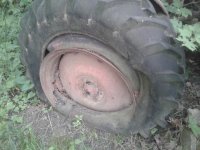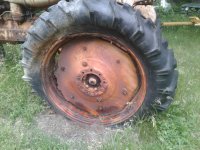You are using an out of date browser. It may not display this or other websites correctly.
You should upgrade or use an alternative browser.
You should upgrade or use an alternative browser.
Question regarding calcium chloride in tires
- Thread starter SylvainG
- Start date
- Views: 4979
/ Question regarding calcium chloride in tires
#11
Sawyer Rob
Super Member
I've have tractors with cal. in the rears more than 30 years without any problems at all.
My loader tractor is over 20 years with the rears loaded with cal., they are just fine.
SR
My loader tractor is over 20 years with the rears loaded with cal., they are just fine.
SR
fried1765
Super Star Member
- Joined
- Jan 6, 2015
- Messages
- 10,089
- Tractor
- Kubota L48 TLB, Ford 1920 FEL, 8N Ford, Gravely 12 HP "Professional", 48" SCAG Liberty
I've have tractors with cal. in the rears more than 30 years without any problems at all.
My loader tractor is over 20 years with the rears loaded with cal., they are just fine.
SR
They may LOOK fine, but when you need to replace tires, you will most likely need to replace rims also.
i7win7
Veteran Member
RickB
Super Star Member
- Joined
- Sep 18, 2000
- Messages
- 15,143
- Location
- Up the road from Dollar General WNC
- Tractor
- Just a Scag
They may LOOK fine, but when you need to replace tires, you will most likely need to replace rims also.
If the tires are tubed (which the OP's are not) and leaks are immediately addressed there will be no rim damage. In 2017 I sold a 1976 Case 885 and 1970 Ford 4000 both with pristine original rims that had been calcium filled for many, many years if not since new.
Sawyer Rob
Super Member
Not if you use the tractor much, you will wear the tires out long before the cal. affects the rims enough to need replacement.They may LOOK fine, but when you need to replace tires, you will most likely need to replace rims also.
At least that's what I'm seeing from myself, and my farmer friends...
SR
LouNY
Super Star Member
- Joined
- Jul 4, 2015
- Messages
- 12,520
- Location
- Greenwich, NY
- Tractor
- Branson 8050, IH 574, Oliver 1550 Diesel Utility (traded in on Branson) NH 8160. Kioti CK2620SECH
Well many years ago all of our farm tractors had calcium filled tires.
This past year two of them had to have new rims the JD 4020 and one of the IH 656's.
The 560 got new ones a couple of years ago.
My 574 because it is not used for heavy work got about 10 hours of welding repair and grinding last year.
I think out of over a dozen tractors on the farm, one may still have calcium it the rest are all dry and carry wheel weights instead.
I have seen rims that rotted out in a dozen years and others that have made it 50 years.
I use iron and will not fill a tire with liquid if I can avoid it anymore,
that said calcium fill is the least expensive way to add considerable weight to a tractor.
This past year two of them had to have new rims the JD 4020 and one of the IH 656's.
The 560 got new ones a couple of years ago.
My 574 because it is not used for heavy work got about 10 hours of welding repair and grinding last year.
I think out of over a dozen tractors on the farm, one may still have calcium it the rest are all dry and carry wheel weights instead.
I have seen rims that rotted out in a dozen years and others that have made it 50 years.
I use iron and will not fill a tire with liquid if I can avoid it anymore,
that said calcium fill is the least expensive way to add considerable weight to a tractor.
Tractor Seabee
Elite Member
- Joined
- Oct 5, 2011
- Messages
- 3,896
- Tractor
- Kubota BX25
When calcium started as a weight for tires it was the go to method especially in colder climates. Calcium does too things, adds weight and prevent water fill from freezing. In my industrial refrigeration days calcium was used as secondary refrigerant for product freezing. We mixed it sometimes to withstand -60F degrees. At that concentration is is like syrup and very heavy. That was like 20#/gallon of water. 3 times the weight of the water. Non of the other common ballast liquids come even close to that. Proper ballast calcium has an additive to prevent oxidation of the steel rims. If you have constant leaks and add air often the additive will dilute rapidly and then corrosion sets in. In general it destroys the rubber much faster than the steel. The refrigeration applications were open to atmosphere so we had to add inhibitor often and add calcium as it sucked water from the air and diluted. Weekly testing.
Interested in how we got to -60 ask your questions in a new thread.
Ron
Interested in how we got to -60 ask your questions in a new thread.
Ron
i7win7
Veteran Member
Knew CaCl could be used for dust control but didn't know it's added to some foods
Calcium chloride - Wikipedia
Calcium chloride - Wikipedia

